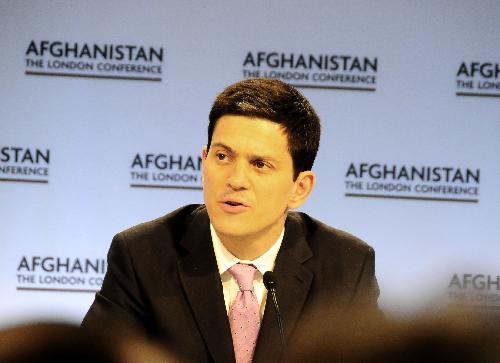Int'l community underlines support for Afghan gov't
He said that international forces would do their utmost to help the Afghans achieve the goals they have set out, saying that "I want to assure the Afghan people that they will not be left behind. "
"It is not a run for the exit. We will stay as long as it takes to secure the country and help them to develop a capacity so that they can run their own country," he added.
On development and governance, British Foreign Secretary David Miliband said the most important achievement of the meeting is the "unity and coherence" of the international community behind the Afghan government's plan to bring peace and stability to the country.
British Foreign Secretary David Miliband speaks at a concluding press conference of the "Afghanistan: the London conference", in London, capital of Britain, Jan. 28, 2010. The international community on Thursday underlined its support for the Afghan government and its security, development and governance following the one-day meeting in London. [Wang Yahong/Xinhua]
Speaking at a press conference to wrap up the day-long meeting, he said that the "unifying theme" of the conference was the Afghan people wanted and deserved a better future.
Miliband said the aim of the conference was to align the civilian and military resources of all coalition partners behind a clear political strategy to help President Karzai's government deliver the ambitious agenda that he set out.
"The international community has recognized the need for us to up our game just as we ask the Afghan government to up their game, " he said.
Conference Participants supported the ambition of the Afghan government whereby donors increase the proportion of development aid delivered through the government to 50 percent in the next two years, including through multi donor trust funds that support the government budget, such as the Afghanistan Reconstruction Trust Fund and the Law and Order Trust Fund for Afghanistan.
On regional cooperation, conference participants reaffirmed their support for a stable, secure and democratic Afghanistan, acknowledged Afghanistan's potential role as a land-bridge between South Asia, Central Asia, the Middle East and the Far East and renewed their pledge to work together actively to this end.
Emphasizing the theme of enriching regional cooperation, participants welcomed the contribution made by specific bilateral and regional projects including that of the Organization of the Islamic Conference (OIC) on education and tackling radicalization, the Organization for Security and Cooperation in Europe (OSCE) and the Afghanistan-Pakistan Cooperation Workshop on border management.
They were grateful for the information given by several countries on bilateral initiatives including the Afghanistan- Pakistan Trade and Transit Agreement, on which they welcomed progress achieved and looked forward to a timely conclusion, and the Indonesian programs for capacity building including technical cooperation in the fields of education, health, agriculture, poverty reduction, renewable energy and small and medium enterprises.
Speaking at the press conference, Kai Eide, the UN Special Representative in Afghanistan said: "I believe that this conference has for the first time set out a clear agenda with clear priorities from Afghan government."
Special Adviser to President Karzai Rangin Spanta said: "The Afghan desire was and is to take more responsibility and demonstrate ownership of the whole process of state-building in my country."
"This is our firm commitment to take responsibility to defend our country and in this regard we need your support," he said.
The London conference will be followed by a conference in Kabul later this year, hosted by the Afghan government, where it intends to take forward its program with concrete plans for delivery for the Afghan people.
Representatives from over 70 countries and international organizations gathered here to fully align military and civilian resources behind an Afghan-led political strategy. The strategy will engage the Afghan people in defense of their country to divide the insurgency and build regional cooperation.
 0
0 







